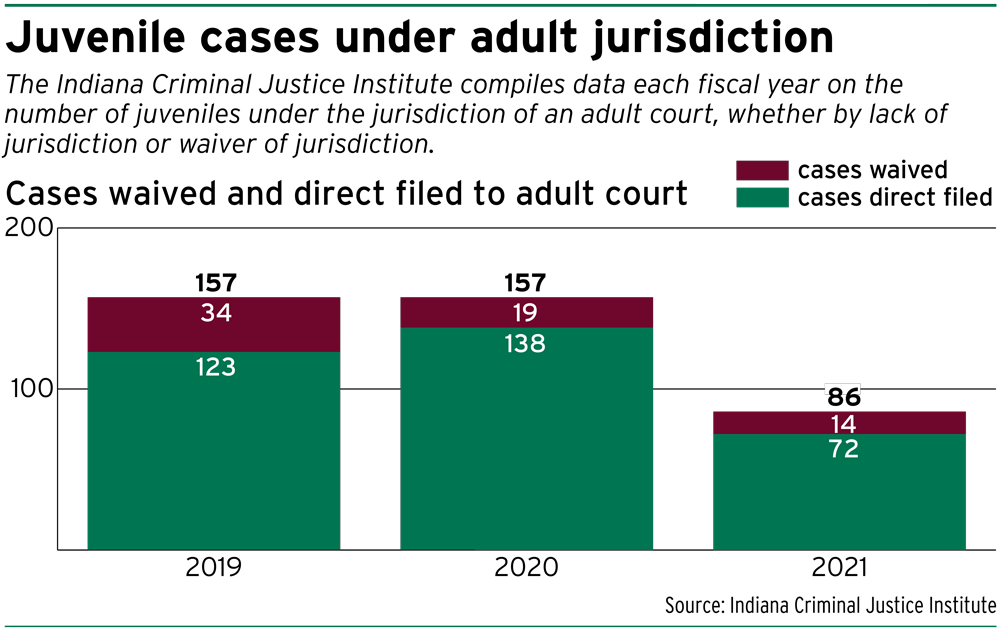Subscriber Benefit
As a subscriber you can listen to articles at work, in the car, or while you work out. Subscribe NowA new law should erase what Indiana Supreme Court justices have referred to as a “jurisdictional gap” that has allowed people who commit offenses before their 18th birthday to essentially avoid legal consequences as long as charges weren’t filed until after they turned 21.
 Indiana lawmakers during the 2023 legislative session passed Senate Enrolled Act 464, which establishes that an adult criminal court has jurisdiction over a person who is currently at least 21 but who committed an offense as a minor, as long as the offense could have been waived to adult court. The juvenile court has jurisdiction over an offender if the offense couldn’t have been waived.
Indiana lawmakers during the 2023 legislative session passed Senate Enrolled Act 464, which establishes that an adult criminal court has jurisdiction over a person who is currently at least 21 but who committed an offense as a minor, as long as the offense could have been waived to adult court. The juvenile court has jurisdiction over an offender if the offense couldn’t have been waived.
The legislation also alters the definition of what a delinquent act is.
Now, rather than saying a child commits a delinquent act if the act would be an offense “if committed by an adult,” state law will simply say a delinquent act is “a misdemeanor or felony offense.”
Indiana Gov. Holcomb signed the bill into law May 1.
While some say there are still questions about how the new law will be applied in practice, there has been seemingly universal agreement that it was necessary to address the legal loophole.
‘You want to be fair’
A majority of Indiana Supreme Court justices made the issue clear in their 2022 opinion in the case of State of Indiana v. Anthony J. Neukam, 21S-CR-567, which involved a man who allegedly committed child molesting while still a minor but whom the state didn’t attempt to criminally charge until he was over 21.
The case, the court ruled, “falls within a jurisdictional gap only the legislature can close.”
Justice Geoffrey Slaughter wrote for the majority that also included Chief Justice Loretta Rush and then-Justice Steven David. Justices Christopher Goff and Mark Massa dissented, arguing the Indiana Legislature “would never have intended” for the alleged criminal act to go unpunished.

Now, Rep. Wendy McNamara, R-Evansville, who sponsored the legislation in the Indiana House of Representatives, said she’s confident SEA 464 addresses the judicial gap.
“We also wanted to make sure that it wouldn’t come back to us again from the Supreme Court saying that we missed something,” McNamara said.
The legislation is complicated, McNamara said, and she even made a flow chart for herself to make sure everything was put together correctly.
Part of the reason for that, she said, was because of the new definition of what a delinquent act is.
“You want to be fair,” McNamara said, noting it’s important to balance the fact that a 15-year-old, for example, is different from a 25-year-old.
That’s where other parts of the legislation come into play.
In a scenario where the offender was less than 18 at the time of the offense, that person can file an additional petition for sentence modification without the consent of the prosecuting attorney after serving 15 years of a sentence, or 20 years if the sentence was for murder.
The legislation also allows a court to consider as a mitigating factor the fact that the offender was a juvenile when they committed the crime.
Additionally, a person ordered to register as a sex offender can petition the court after completing sex offender treatment, and the court “shall consider expert testimony” concerning whether they are likely to repeat the offense.
‘It’s a good law’
While the courts referred to the loophole as a “jurisdictional gap,” Courtney Curtis, assistant executive director at the Indiana Prosecuting Attorneys Council, called the gap a “black hole” between the adult and juvenile courts.
“We are grateful that this bill was passed because this was an injustice to have this black hole here where offenders weren’t held accountable and victims didn’t get justice,” Curtis said.
Part of the balancing act, Curtis said, was in trying to account for the fact that offenders who fit the description for serious crimes will automatically go to adult court, whereas it’s not a guarantee that they would have been waived to adult court if charges came while they were still a juvenile.
The tradeoff, she said, is that the adult court now gets more options for sentencing.
“This was a necessary change,” Curtis said. “It was a good bill. It’s a good law.”

Joel Wieneke, senior staff attorney at the Indiana Public Defender Council, said he sees some good things in the legislation — namely, the opportunities for sentence modification and sex offender registry petitions. But he said he still has some concerns.
“I’m not 100% certain that the new definition of a delinquent act cures the problem addressed in the Neukam case,” Wieneke said, adding that the courts will have to grapple with how the new law is applied.
Defense attorneys, he said, will argue the transitional piece — where a “delinquent act turns into a criminal act just because you’ve aged out” — isn’t there.
‘I was supposed to die in prison’
John Vance has already experienced a direct impact from the jurisdictional issue spelled out in Neukam.

Vance was in prison from the age of 15 to 46 for murder, conspiracy to commit murder, robbery and conspiracy to commit robbery. He was initially charged in juvenile court but was waived to adult court. Vance faced consecutive sentences of 60 years, 30 years, 20 years and 10 years.
“I was supposed to die in prison,” he said.
But Vance sought permission to amend his post-conviction relief petition to cite the jurisdictional issue in Neukam, and the prosecutor on his case agreed that if he dropped the petition with prejudice, the office would agree to allow a modification hearing.
A Johnson Circuit Court judge granted the motion, and Vance was released in October 2022.
A few months later, Vance, now a paralegal at the Marion County Public Defender Agency, was at the Statehouse testifying on SEA 464.
“It was a very surreal experience for me to be able to go in there and advocate for other juveniles,” he said.•
Please enable JavaScript to view this content.

